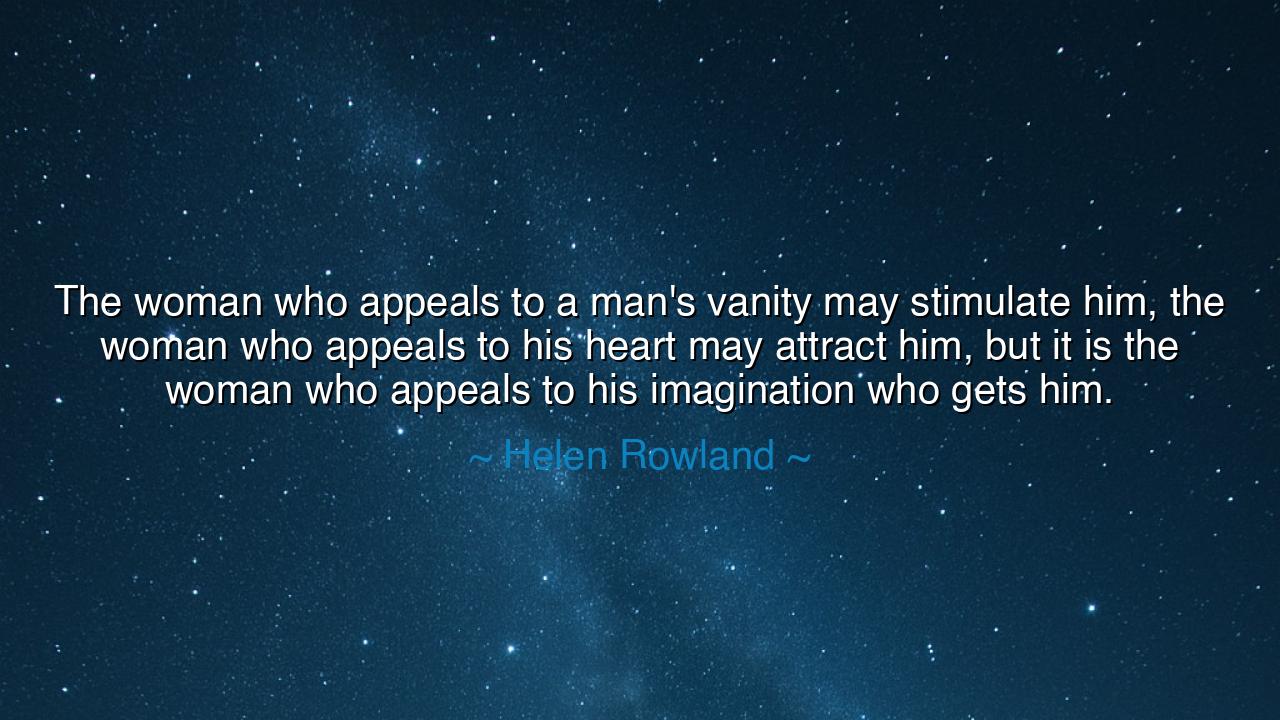
The woman who appeals to a man's vanity may stimulate him, the
The woman who appeals to a man's vanity may stimulate him, the woman who appeals to his heart may attract him, but it is the woman who appeals to his imagination who gets him.






“The woman who appeals to a man’s vanity may stimulate him, the woman who appeals to his heart may attract him, but it is the woman who appeals to his imagination who gets him.” Thus wrote Helen Rowland, the American essayist and wit of the early twentieth century, whose words of wisdom on love and human folly still shimmer with truth and fire. In this single line, she reveals the secret alchemy of attraction — that beyond desire, beyond affection, there lies a deeper enchantment: the power of imagination. For the imagination, once captured, binds the soul more tightly than beauty or sentiment ever could. It is not merely the eye or the heart that holds love — it is the dream that love awakens within the mind.
The origin of this quote is found in Rowland’s Reflections of a Bachelor Girl (1909), a collection of sharp, elegant observations on love, courtship, and the eternal dance between men and women. Her wit was the sword of a philosopher, wrapped in the silks of humor. Living in an age when women were expected to charm through grace and obedience, Rowland understood something far deeper — that true power did not lie in submission or surface beauty, but in mystery, in the ability to awaken imagination. Her words are not about manipulation but about the art of connection: how the mind and spirit can be more intoxicating than the flesh.
To appeal to vanity is to touch a man’s pride. It flatters him, excites his ego, makes him feel larger than life. Yet this flame burns quickly, for vanity is a fragile mirror — it reflects only the self, not the other. To appeal to the heart, on the other hand, is to stir tenderness, compassion, and affection. This, too, is noble, for it builds warmth and devotion. But the heart, though deep, can grow accustomed, and the fire of romance can cool into routine. What Rowland unveils is the third and greatest path — to appeal to the imagination, to awaken in another the vision of something wondrous and infinite. This is the power not of possession, but of enchantment — the power to become a symbol of dreams, a spark of the mysterious within the ordinary.
Consider the story of Cleopatra, queen of Egypt, whose name has echoed through centuries not because of beauty alone, but because she mastered the art of imagination. Men of might — Julius Caesar and Mark Antony — fell not merely for her appearance, but for the myth she embodied. She made herself a vision — a living poem, a goddess of Nile and moonlight, wisdom and danger. Her presence was theater, her voice a spell. She was not merely seen; she was imagined. Even in death, she lives on as the eternal symbol of allure and power. This is what Helen Rowland understood: that love, at its deepest, is not only felt — it is envisioned.
For to capture the imagination is to live within the mind of another. It is to become a muse — a spark that continues to inspire even when absent. Physical attraction fades, emotional affection can falter, but what the imagination loves remains immortal. The artist remembers the muse not for her touch, but for the dream she inspired; the lover remembers the beloved not for her face, but for the mystery she embodied. To touch the imagination is to touch that part of the soul that hungers for eternity.
Yet Rowland’s insight reaches beyond love between man and woman. It is a truth about all human connection. The teacher who inspires, the leader who motivates, the creator who moves hearts — all succeed because they speak to the imagination, not merely to intellect or emotion. The imagination is the divine spark in every person, the place where potential meets possibility. To awaken it in another is the highest art of influence, the noblest form of love.
So let this be your lesson, O seeker of wisdom: do not strive merely to be loved — strive to be imagined. Do not seek to please the senses or flatter the ego; seek instead to awaken wonder. Be mysterious, not for deception, but for depth. Let your presence suggest worlds unseen, dreams yet to unfold. When you move, move with meaning; when you speak, speak with soul. For it is not the fleeting admiration of the eyes nor the gentle warmth of the heart that endures, but the eternal flame of imagination.
Thus, Helen Rowland’s words transcend time: the woman — or indeed, any soul — who appeals to imagination becomes unforgettable. For imagination is the soil from which all love, all art, and all greatness grow. To live in another’s imagination is to live forever — not as flesh, but as light. And what greater triumph of spirit can there be than that?






AAdministratorAdministrator
Welcome, honored guests. Please leave a comment, we will respond soon